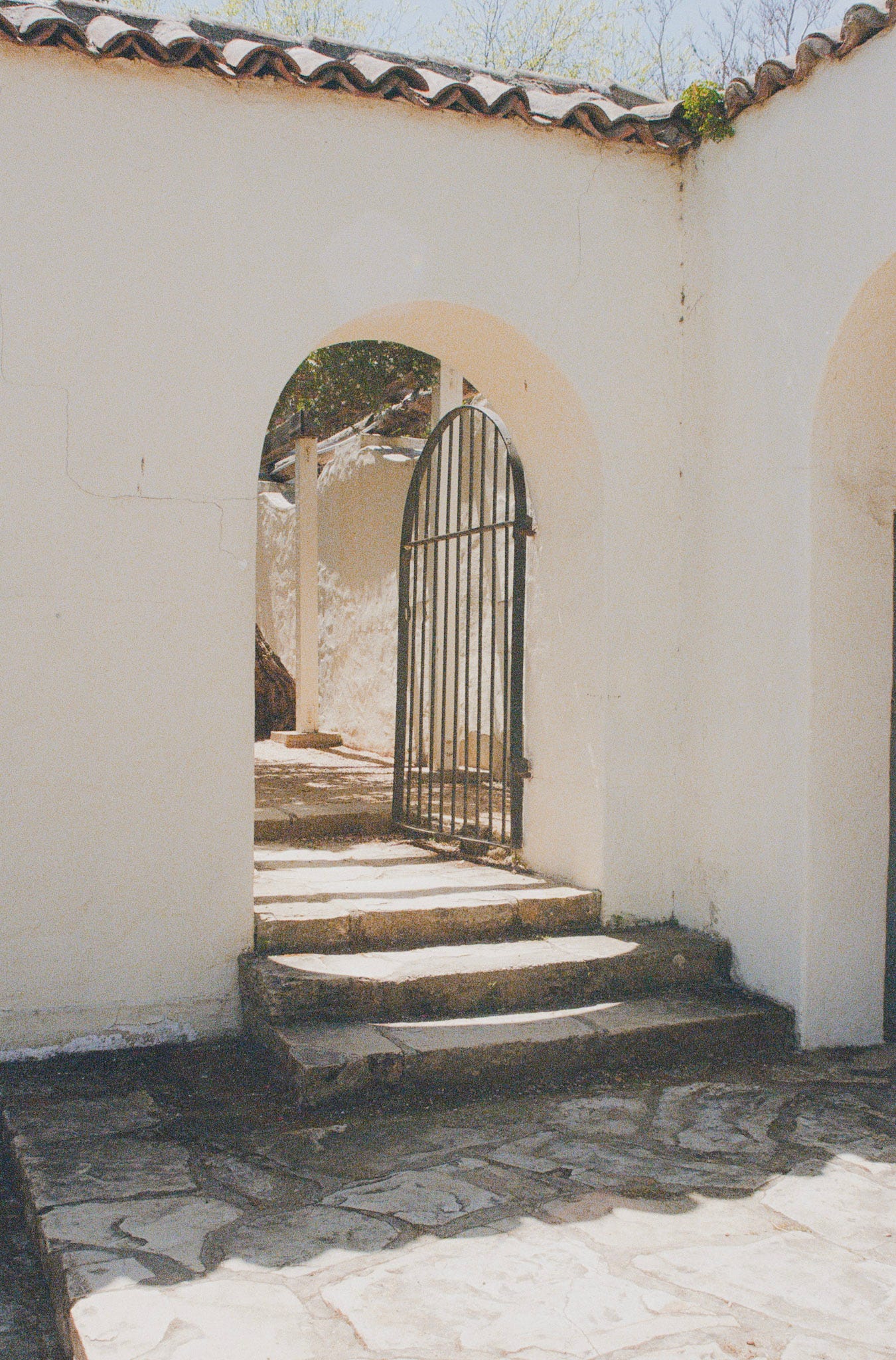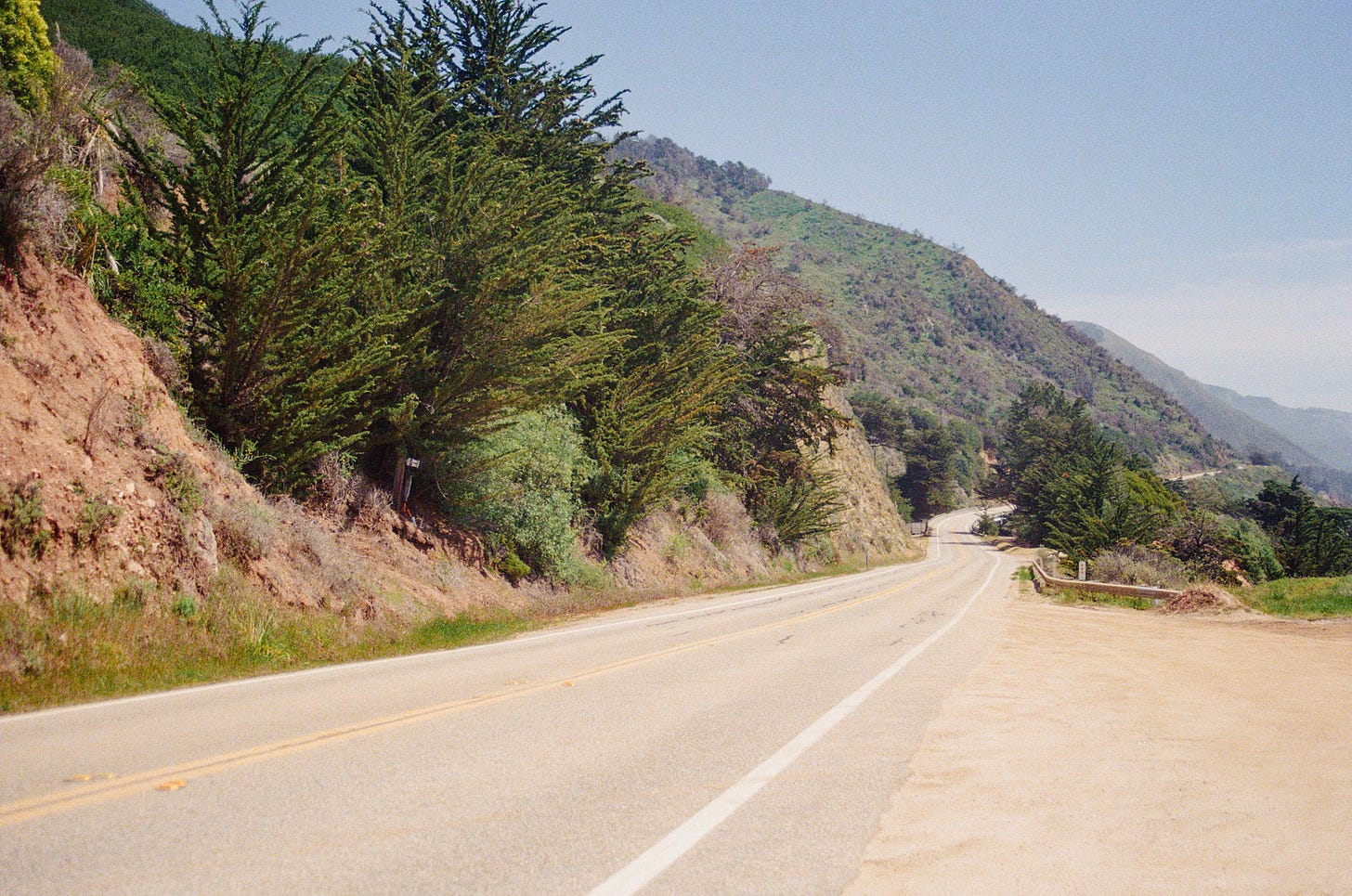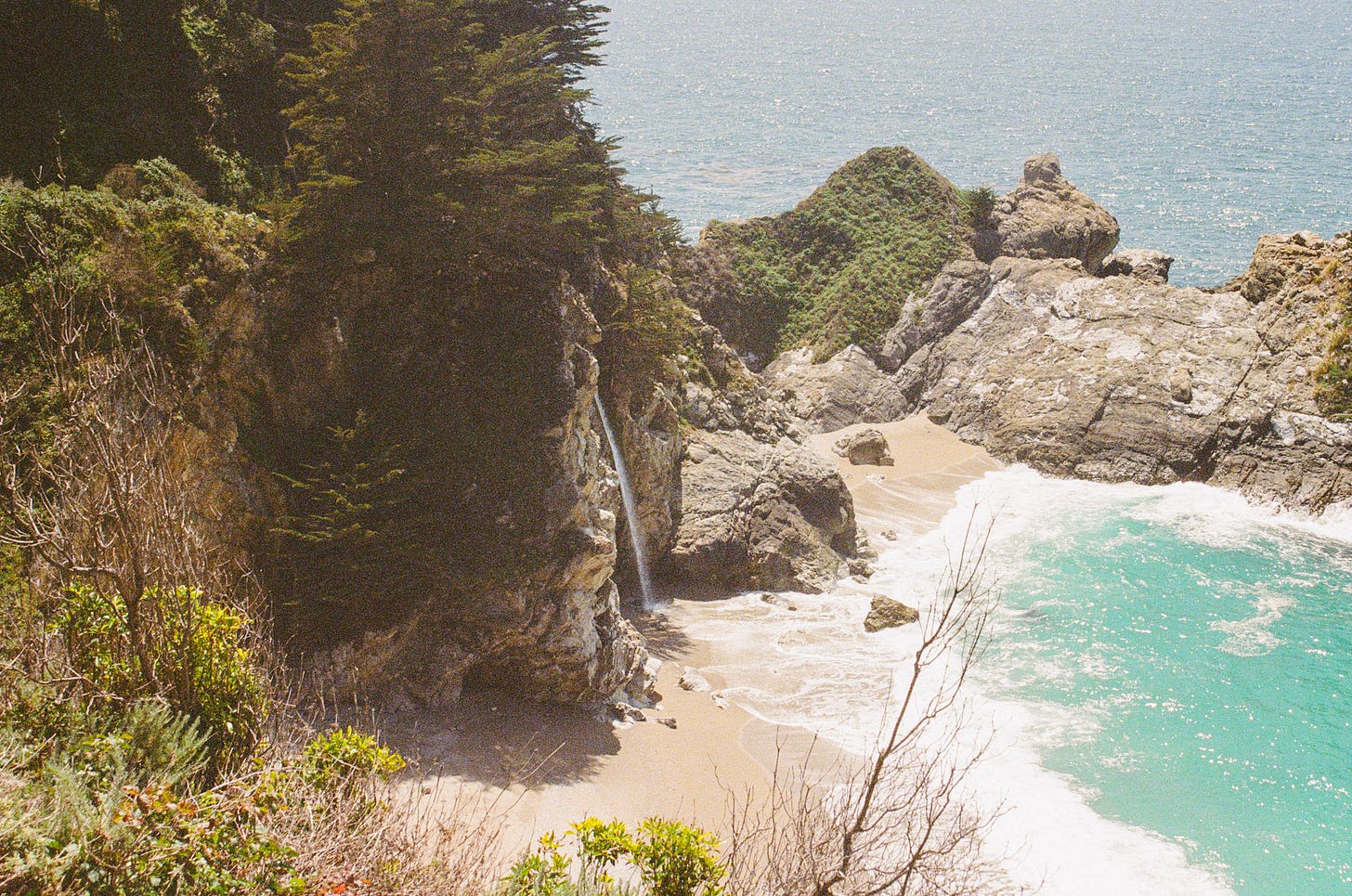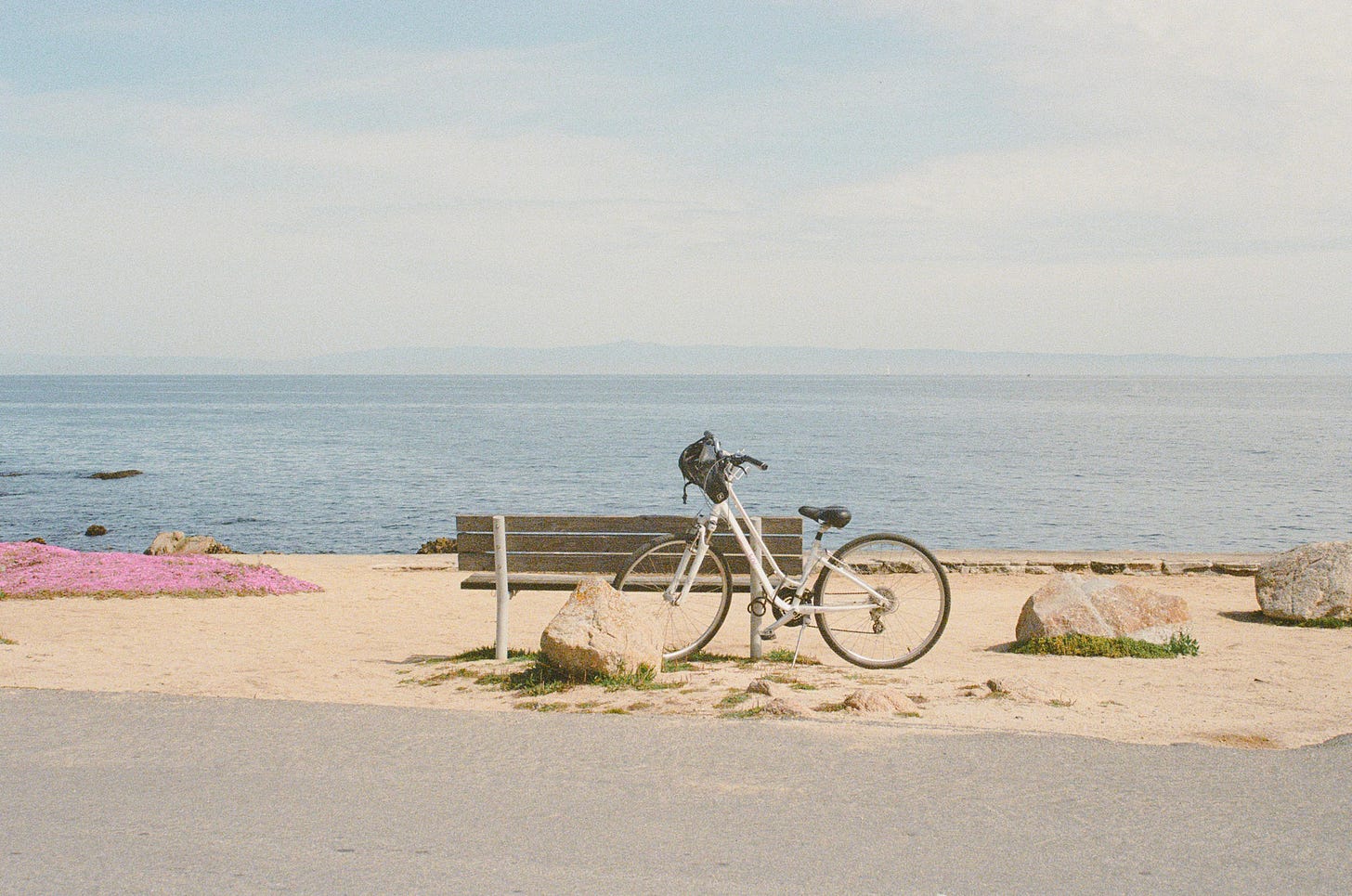(1) THE SUITCASE
I am at a yellow motel along Highway 1. The Monterey Surf Inn. I am waiting for my suitcase, which is also yellow, to arrive. The airline lost it when I caught a connecting flight in Dallas, and so now, I only have the clothes I am wearing and my backpack, holding only a book, my camera, and my wallet. A friend once told me to always have a change of clothes and a toothbrush in my carry-on; I obviously didn’t listen, but now I see I should have. I don’t know what to do with myself yet, but I have a rented blue Nissan. I drive it out to the coast, park, and go walking. I know I must see the sea. That is why I came here, after all.
There are rough, rocky, sloping cliffs covered in purple. I find a spot to sit down. I see a pod of seals shimmying against the waves. A black bird floats in the water bobbing in between the rocks as the water fills up, overflows, and empties again.
I continue walking through the town. Trendy college students and international tourists fill the streets around me. I find a free museum and wander through it. It catalogues the influences of the Spanish, Mexican, Japanese, and Italian immigrants on the town, who once travelled here and put roots down. It pays homage to the native tribes whose roots were severed. Wisteria hangs over the adobe plaza. Water bubbles out of blue tiled fountains. Across the street I find a gate leading to a “secret garden” and I follow it. The garden is small and blooming.
After all this wandering, I am hungry. I go to an Italian restaurant. Il Vecchio. Translation: The old. I sit in a corner booth with pillows. I am reading Elena Ferrante, which now that I am eating in an Italian cafe, seems on the nose, but I did not intend for this parallel. I am the only customer under the age of 60 it seems. The cafe is quiet, and I can make out the conversations happening around me.
Seated near the window, a professor describes his grading system to a colleague. He uses the French system, he says. I don’t know what means. The subject changes to the division between the rich and the poor, which then turns into a discussion of the rising gas prices.
A table over sits two women. I catch one’s name. Franny. Franny speaks of writing a poem for her ex-boyfriend’s son’s birthday. They discuss their mutual friend, who is 85 and Catholic, and who is reading spiritual books to prepare for her death. Each stage has its own challenges, Franny says. She will have a happy death because she is prepared—I will also have a happy death, because I’m prepared too. The subject changes and they discuss London and unseasoned food. Franny argues that food is much better in France. But of course, so much of France’s food actually comes from Italy, she says. I am eating wild cod and potatoes as I listen. I am rather underwhelmed by the taste.
After my meal, I drive to the dunes. Sand hills covered in blankets of red and green flowers. Men sit alone in pickup trucks parked along the dead end road, wearing bright orange and yellow, having just finished their shift at a nearby construction site. They are watching the sun set over the Pacific. I walk alone along the boardwalk, watching the sunset too.
That night, my yellow suitcase arrives at the yellow motel at midnight. The courier knocks on the door and I get up to take the suitcase from him, still half-asleep, in a fever dream. In the morning, when I wake up, I am surprised to see it sitting on the floor at the edge of the bed and have trouble recalling how it got there.
(2) POINT LOBOS
I go to Point Lobos in the morning. At Wolf Point, I am enamored. There are no wolves, but I do see three seals, one of which was just a pup. I try to zoom in with my camera, and I snap a picture. I keep walking, until I see a large rock looming up and out of the water. It is covered in a flock of condors. I stand and watch them for a minute, squawking loudly to each other, flying away only to return seconds later. The vegetation is thick, and the trails are quiet. Moss hangs from trees, pines loom, and cypress trees bend permanently in the way of the wind. I find a bench overlooking a cliff and sit for a while.
The south shore is almost violent. The cliffs are high. The wind is rough. It shakes something loose. The cove is covered in large black rock. I stand as close as I can. The waves are monsters and I’m welcoming them. Sea spray hits my face. I close my eyes and feel calm.
(3) THE LILIES
I go to Garrapata. I’m trying to find the calla lily valley – they’re in bloom right now – but my phone loses service in the Highlands. So I take the first trail I see. There are no maps posted, but there is a warning sign: Second trail closed. I only see one trail, the trail I am on, so I keep walking.
A short ways past the roadside trees and a metal barn, I find a bridge. A single calla lily blooms next to the path, and so I feel encouraged. I cross the small creek and the landscape shifts. Tall mountains rise up around me, covered in cacti and succulents. A yellow dirt trail winds through it all, so I follow it. Someone has written HELP in the dirt. It feels ominous, but I shake it off.
Then there’s another creek. Here, there is no bridge, but a heavy log. I walk across that too. Again, the landscape shifts. I have entered a grove of redwoods, dark and wet. I follow the trail winding alongside the creek. I hear a noise from an animal I don’t recognize. I notice the darkness and realize I am very alone, and without a map. It seems more and more unlikely the calla lilies are anywhere nearby. I turn around.
I take the blue Nissan and head into Carmel to find something to eat, which looks like a village ripped from a child’s storybook. Not in a charming way, but in a manufactured way. It’s full of boutiques I know I can’t afford, and I don’t bother peeking in. I head back to Garrapata, again looking for the calla lilies.
I finally find them in between two tall bluffs. There’s a jungle of them, white blooms everywhere, all wild and wrapped around one another. A small footpath winds its way through the thick roots. It is deceivingly rocky. I try to hop over a patch of mud, but I trip on a rock and fall, twisting my ankle. I keep on walking through the valley, limping. On the other side is the Pacific. It’s nearly golden hour, and the sand is starting to glow.
(4) HIGHWAY 1 AND BIG SUR
I eat in a cafe, a red house. It’s Easter Sunday but I am not celebrating. I drink a Bloody Mary and eat an Eggs Benedict made with a croissant. I sit in a black and white chair on the porch surrounded by hanging baskets of flowers. I read Elena Ferrante again. The Lying Life of Adults. Today I will be taking the blue Nissan down Highway 1 to Big Sur.
Highway 1 is as turbulent as the wind. The coast is dangerous, but I won’t call her threatening. That’s not what I mean by turbulent. She’s forceful and demanding. She’s manic. And she’s not here to give you peace. She’s here to exist in her own wild state of her choosing. That is what I mean by turbulent.
At first, I feel okay. Then I round another bend of the road and the particular enormity of the cliff looms suddenly, daring to swallow me, to crush me, to push me over the edge, and a sudden knot of fear forms in my throat. I breathe the knot away. I play “Cherry” by Christian Lee Hutson and sing along.
I drive over Bixby Bridge. I park and walk down to McWay Falls. A painter is set up, working on a watercolor of the falls. She is silent. No one bothers her, but they point and smile, delighted. From this vantage point, McWay Falls seems small, but it really isn’t. It’s an 80 foot tall solid stream of freshwater. I imagine my father standing here, looking at the same waterfall. He also visited Big Sur in his twenties, sometime in the late 1970s. Back then, the falls poured itself directly into the Pacific. My father and one of his friends had ridden cross-country on a motorcycle, all the way from Wisconsin, to get here. Along the way, they had camped out in farmer’s fields, or wherever there was land, and never got in trouble. I love this story, but the idea of Big Sur has always had a pull on me, even before I ever heard it. This is just one way I know I’m my father’s daughter.
I take a walk through the redwoods. My ankle still hurts, though I have been wrapping it and using Icy Hot patches from a nearby Walgreens. The trail is steeper than I thought. The redwoods, of course, are enormous. The forest is wet. I see burn marks on some of the trees. I read a sign about the wildfires. I feel both a kind of grief and a blessing that these trees have survived. (Many months after this, back in Nashville, an ecologist I go on a few dates with will tell me: You are lucky to have seen those trees. He will tell me how he hopes to make it out west again soon, to see the giant sequoias. Before it’s too late). Eventually, I make it to Pfeiffer Falls. I rest on a bench and watch a scrub-jay fluttering around the pool of water.
Back along Highway 1, I find a bookstore called the Henry Miller Memorial Library, though it is not, in fact, a library. Sculptures line a path to the bookstore, including a wire Jesus on a cross made out of outdated PCs. Books wrapped in plastic hang from trees. The store has a stage outside, an art studio, and a large porch, surrounded by redwoods. Inside, the clerk is complaining about people asking for the wifi password. I buy a book of Anais Nin’s journals, detailing her love affair with Henry Miller. (This is the beginning of my own love affair with Anais Nin’s writing. Here is one passage I will underline from Henry and June: “The old pattern of my life is shattered. It hangs around me in shreds. Great things are going to happen from all this. I feel the fermentation. The train which takes me home from Louveciennes shakes phrases in my mind like dice in a dice box.”)
(5) BIKE RIDES AND OTHER LUXURIES
I go to the wharf and walk through Cannery Row. It is empty and silent. I try to imagine it as Steinbeck saw it.
I go biking through Pacific Grove. When I tell the shop owner of the bike rentals I’m from Nashville, he gets excited. He loves country music, he tells me, and he recommends me a song by Uncle Kracker. I smile and thank him. And then I’m off. It feels good to be back on a bike. I ride as though I never stopped, coasting down hills, unbothered by passing cars.
I pay my respects for both my mother and myself at the John Denver memorial. This is the site where in 1997, John Denver’s plane ran out of gas and crashed into the ocean. I lay two blue shells on the rock and send her a picture. Then I go to the Marine Reserve to see more seals. It’s pupping season. They are cute, happy, lazy. I go hunting for driftwood. I look up and see the whales. I see their sprays, the fin of one going up, then going back down. I walk along the tide pools, wading in amongst the snails.
Orange poppies cluster along the roadside. I chain my bike up and walk among bushes of succulents, wild morning glories, and so many more that I do not have the names for. Purple, yellow, white, pink. I find large rocks to climb and I sit and watch the waves. I’m trying to find peace, but what I find instead is a gasping wonder at the wilderness of the Pacific.
In the afternoon, I am agitated. I go to the dunes again. Even the dunes are decorated with blankets of colors. I wade in for one last time. The waves almost pull me away. I sit in the sand and try to write, but soon, I am too cold. I want to relax. My body aches. Still, my ankle throbs.
I get the idea to sneak into a hotel pool and look for a hot tub. Anything to soothe the pain. My motel certainly does not offer this; I don’t even have a bathtub. I’m successful at the Hilton, but the pool is full of loud, large families, and there is no hot tub anyways.
Instead, I find a spa nearby, in Carmel. I spend two hours in various outdoor hot tubs, surrounded by cypress trees and the Highlands. Hot water cascades down rock. I press my hands to the rock and to the water. I let the falls run over my hair. I float on my back. It’s cloudy tonight, and I can’t see any stars. I am cocooned by the hot water and night sky. California holds me in her palm tonight. I can taste her salt on my lips.
I read a bit by the campfires wrapped in a heavy white robe. It is a simple luxury, and I am satisfied.
(6) THE BEST ENDING
I leave as I arrived. The plane takes off from a small regional airport. There is no one seated next to me. The plane is stale and quiet. Outside, it is a bright, sunny day, and there’s no turbulence. It’s not long before I finish the Ferrante novel.
I look out the window. There are roughly 35,000 miles of pure air between myself, this plane, and the Earth. There’s an emptiness I feel, looking at this space, knowing I will be home soon. The trip is over. The book is finished. I had wanted to see the sea, and I saw it. I had wanted to find the calla lily valley, and I found it. I had wanted to see the whales and the pups and McWay Falls and I saw them all. Now what?
And so now what with the rest of my life as well? After certain desires are fulfilled, do I just keep on finding new desires? On and on and on? It sounds like it should be a pleasurable existence—so why was I feeling this emptiness? Had I been hoping to find something else in California? Had I been looking for something? Had I been hoping I would feel changed by it? (Wherever you go, there you are. Isn’t that what they say?) Again, I am reminded of my mother’s words: My face in the mirror gets older, but inside, I still feel like the same person I was when I was a young girl. The same girl I have always been.
I think of the person I am in love with. This person doesn’t know, and would never know, I had already sworn it to myself. This was a desire never to be fulfilled. But what happens with an unfulfilled desire? Where does that feeling go, that energy? What am I supposed to do with it? Am I supposed to lock it away in a metaphorical box, place it on a metaphorical bookshelf, and just hope it fades away? Am I supposed to forget about it? Or am I supposed to harness that energy and transform it into something else, something new, something easier to live with? I have no answers, so instead, I turn to writing.
While you are Real, you are still very much an Idea. And keeping you an Idea, a Story, it is easier to love you. I have always loved easily and fiercely. But have I loved like this before? My head says probably. My heart says no. I just can’t remember, because memory is like that. It is always tainted by hindsight.
I imagine you love me too. In all my imaginations, the best ending goes like this: You wait. I wait. Maybe years, even. But we don’t stop loving each other, and one day, the timing will be okay.





